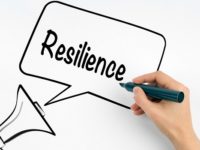Aaron just gets on with it. No matter what adversity he faces, he pushes through it. On the outside it looks like nothing phases him, everyone admiring his capacity to keep going despite all the changes going on.
Persistently working hard, Aaron has no time for emotions as they only serve to get in the way. Societal conditioning rewarded his behaviour with respect, all the while wearing his stoic effort like a badge of honour.
But what is really going on here? Is this just a resilient hard-working individual?
Resilience is usually classified as the capacity to move through challenging events and the uncomfortable emotions that surface. Dr Susan David a Harvard Medical School Psychologist and author of Emotional Agility explains that effective leaders don’t buy into or try to suppress their inner experiences. Instead, they approach them in a mindful, values-driven, and productive way—developing what we call emotional agility.
That said, many of us have times when we detach. Mild emotional detachment can happen when we postpone emotions in order to deal with them at a more appropriate time. It can become a handy coping mechanism, one we often use at work.
This kind of detachment is often called dissociation and with most behaviours, it is placed on a continuum ranging from mild to serious dissociative disorders. For some, being unaffected by emotionally upsetting events isn’t resilience, it can be dissociation and when dissociation remains, we learn to unconsciously repress our negative emotions.
We can even numb out further by having a strong focus on our work. If we just keep working, we don’t have to slow down, because if we slow down there is a potential to have to feel….and that place, can be scary for some.
This coping mechanism of repressing emotions often comes from negative past experiences. Experiences that our mind (and our body) stored as scary, painful, abusive or traumatic and then had no way to process these experiences fully. For many of us, we grew up with caregivers/parents who showed very strong disapproval of any sort of emotion, so we learnt very quickly to suppress (conscious) or repress them (unconscious).
Repressing our emotions can be bad for our health. Dr Gabor Matè, a world stress and trauma expert and author of “When the Body Says No”, speaks often about repressed emotions being a contributor to physical illness, from cancer to autoimmune conditions.
Repressing is unconscious so we may not even have any awareness around it. But if slowing down scares you or being alone with yourself and your thoughts feels uncomfortable, then maybe you might be running from certain parts of yourself that you have denied, rejected or repressed.
In order to operate at our absolute best at work, we need to accept all parts of ourselves both the light and the dark. Both the awesome qualities we love and the parts we don’t want to acknowledge, feel won’t be accepted or feel shameful or guilty about. I have yet to find someone who does not have both the dark and the light within them.
That is simply what it means to be human.
Emotions are signals and even though checking in with yourself at work when you are crazy busy sounds ridiculous, it offers you clues and information. Information such as when we need to rest, when a boundary is crossed, when we are needing more connection, when we are not living our values or when something feels not quite right with a new business deal.
Maybe it is time you decided to get a bit more present with all the feels.











